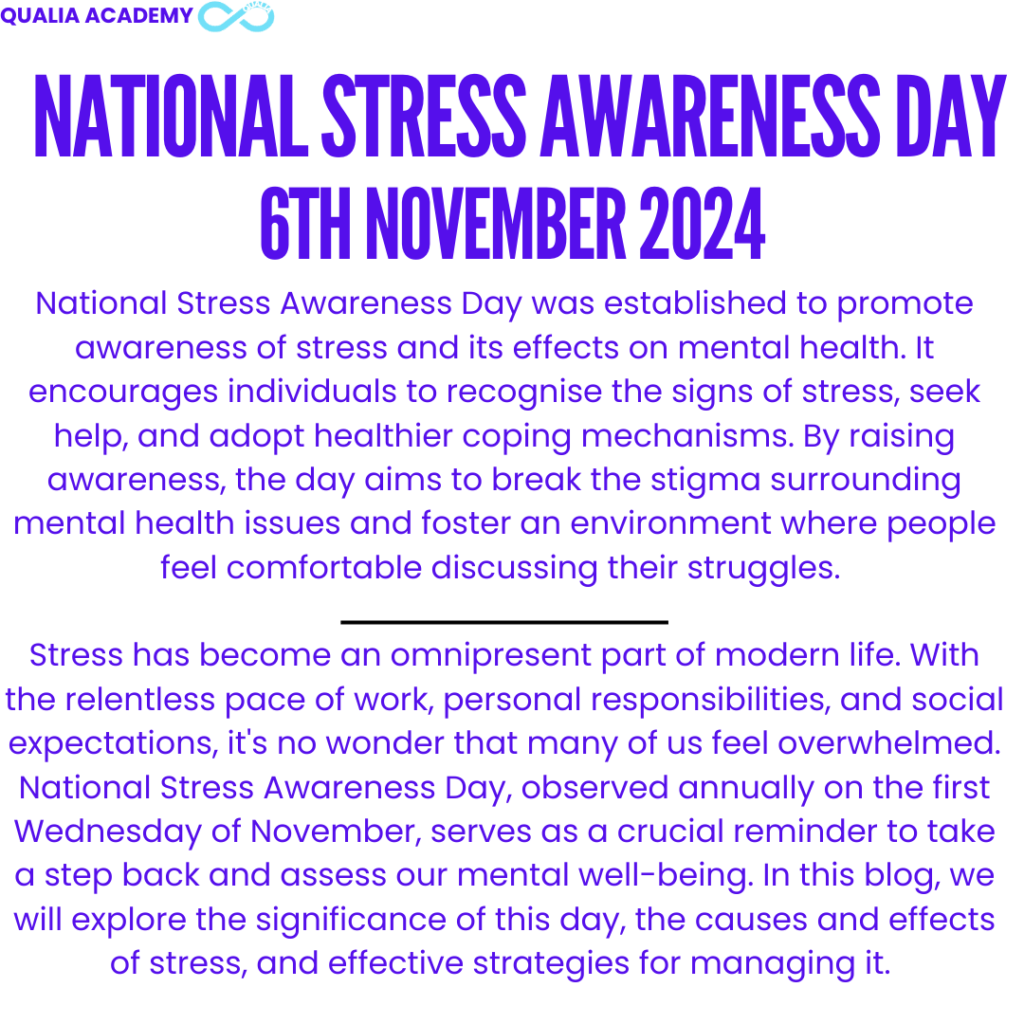
Stress has become an omnipresent part of modern life. With the relentless pace of work, personal responsibilities, and social expectations, it’s no wonder that many of us feel overwhelmed. National Stress Awareness Day, observed annually on the first Wednesday of November, serves as a crucial reminder to take a step back and assess our mental well-being. In this blog, we will explore the significance of this day, the causes and effects of stress, and effective strategies for managing it.
The Importance of National Stress Awareness Day
National Stress Awareness Day was established to promote awareness of stress and its effects on mental health. It encourages individuals to recognise the signs of stress, seek help, and adopt healthier coping mechanisms. By raising awareness, the day aims to break the stigma surrounding mental health issues and foster an environment where people feel comfortable discussing their struggles.
Understanding Stress
Stress is the body’s natural response to perceived threats or demands. It triggers the “fight or flight” response, releasing hormones such as adrenaline and cortisol. While stress can be beneficial in short bursts, helping us respond to immediate challenges, chronic stress can lead to a host of physical and mental health issues.
Common Causes of Stress:
Work-related pressures: Tight deadlines, long hours, and high expectations can contribute to significant stress levels in the workplace.
Personal relationships: Conflicts with family, friends, or partners can create emotional turmoil and lead to stress.
Financial concerns: Worries about job security, debt, and expenses can weigh heavily on individuals.
Health issues: Chronic illnesses, injuries, or the health of loved ones can also be significant stressors.
Life changes: Major life events, such as moving house, changing jobs, or experiencing loss, can trigger stress.
The Effects of Stress:
Mental Health Issues: Chronic stress can lead to anxiety, depression, and other mental health disorders. It can also exacerbate existing conditions.
Physical Health Problems: Stress is linked to various health issues, including heart disease, obesity, diabetes, and digestive problems. It can also weaken the immune system, making individuals more susceptible to illness.
Cognitive Impairment: Prolonged stress can affect concentration, memory, and decision-making abilities. This can impact work performance and overall quality of life.
Behavioural Changes: Stress can lead to unhealthy coping mechanisms, such as overeating, smoking, or excessive alcohol consumption, which can further exacerbate health problems.
How to Manage Stress Effectively
Recognising the signs of stress is the first step towards effective management. Here are some practical strategies to help cope with stress:
Practice Mindfulness and Meditation
Mindfulness involves being present in the moment and acknowledging your thoughts and feelings without judgement. Meditation can help reduce stress and promote relaxation. Even just a few minutes of mindfulness practice each day can have significant benefits.
Exercise Regularly
Physical activity is a powerful stress reliever. Exercise releases endorphins, which can boost mood and alleviate feelings of anxiety. Aim for at least 30 minutes of moderate exercise most days of the week, whether it’s walking, running, yoga, or dancing.
Maintain a Healthy Diet
A balanced diet can significantly impact your mood and energy levels. Incorporate plenty of fruits, vegetables, whole grains, and lean proteins into your meals. Avoid excessive caffeine, sugar, and processed foods, which can contribute to feelings of anxiety and fatigue.
Connect with Others
Social support is vital for managing stress. Reach out to friends and family, share your feelings, and seek advice. Sometimes, just talking about your stressors can provide relief and perspective.
Prioritise Sleep
Lack of sleep can exacerbate stress and make it harder to cope with daily challenges. Aim for 7-9 hours of quality sleep each night. Establish a calming bedtime routine, limit screen time before bed, and create a comfortable sleep environment.
Set Boundaries
It’s essential to set limits on your commitments to prevent overwhelming yourself. Learn to say no when necessary and prioritise tasks based on urgency and importance. Delegate responsibilities when possible and make time for self-care.
Seek Professional Help
If stress becomes unmanageable, consider seeking help from a mental health professional. Therapy can provide valuable coping strategies and a safe space to explore your feelings.
Final Thoughts
National Stress Awareness Day serves as a vital reminder of the importance of mental health in our lives. By understanding the causes and effects of stress, we can take proactive steps to manage it effectively. Incorporating mindfulness, exercise, healthy eating, and strong social connections into our daily routines can significantly reduce stress levels and improve overall well-being. Remember, it’s okay to seek help when needed, and taking care of your mental health is a sign of strength, not weakness.
This November, take a moment to reflect on your stress levels and consider implementing some of these strategies. Together, we can create a culture that prioritises mental health and encourages open conversations about stress and well-being. Let’s work towards a more balanced and fulfilling life.









